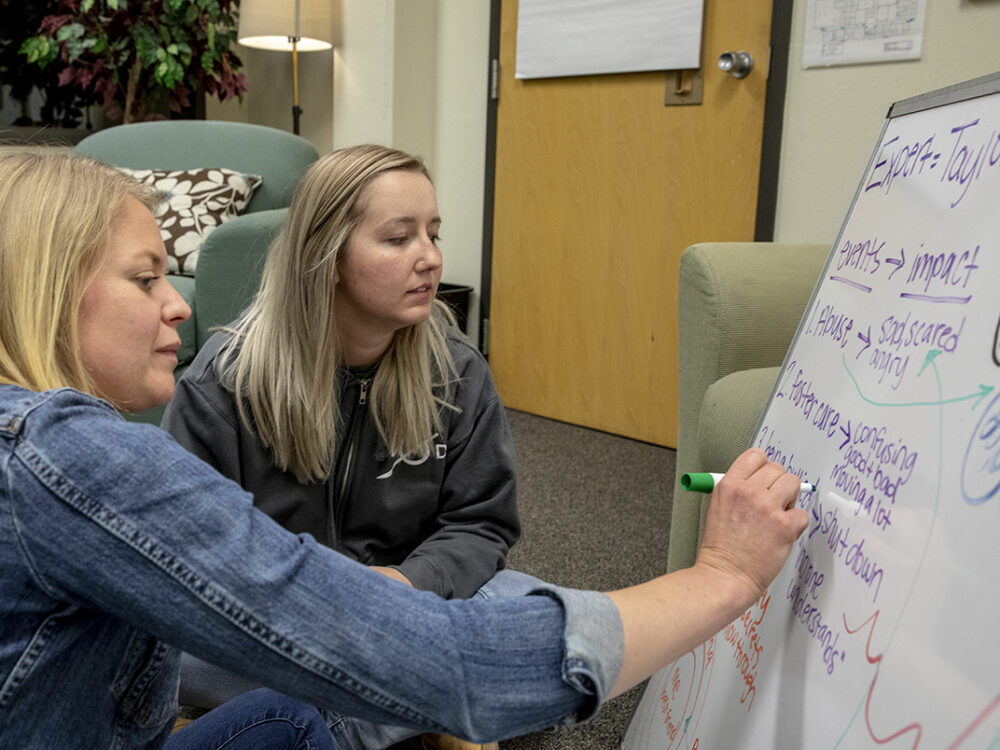Welcome to Project JUSTIS
Project JUSTIS is a new program provided by the CSU Trauma and Resilience Assessment Center (CTRAC). This project is funded by a grant from the Substance Abuse and Mental Health Administration (SAMHSA).
Project JUSTIS serves youth and families in Larimer County. We are looking for youth (ages 8-18) and their families who have experienced trauma and who are currently involved, or at risk for involvement, in the juvenile justice (JJ) system. We will be providing trauma and resilience assessments for youth and caregivers, trauma-informed consultations, evidence-based treatments, and community trainings. All services will be provided free of charge for qualifying youth and families.

Background & Resources
Trauma & Juvenile Justice Risk
The term “trauma” represents experiences that threaten the safety and/or well-being of an individual or someone close to them (NCTSN About Childhood Trauma). This can include experiences that happen to someone directly and/or that they witness happening to others. Here are some common examples, although it is important to note that children respond differently to even the “same” event based on their age, developmental level, the number of times the event has happened, the support they receive, and so forth.
- Physical abuse
- Sexual Abuse
- Emotional Abuse
- Neglect
- Separations from caregivers
- Homelessness
- Exposure to domestic violence
- Exposure to substance abuse
- Other experiences that threaten one’s well-being (e.g., car accidents, natural disasters, etc.).
Childhood trauma is associated with higher levels of post-traumatic stress, deficits in regulation, and poorer experiences in school, all of which can contribute to higher risk of delinquent behavior. Project JUSTIS aims to reduce entry into the juvenile justice system and recidivism by increasing access to trauma-informed screening, services, and systems.
What does this look like in our community?
Larimer County is home to 45,000 youth aged 8-18. Over the past 3 years, there have been just over 2,500 filings for juveniles in the Larimer County District Court (Colorado Judicial Branch Annual Reports 2020-2022). When a youth’s involvement in the JJ system escalates, risk for additional trauma exposure, separation from support systems, and obstacles to treatment increase, highlighting the need for coordination and provision of trauma-informed services for youth at-risk for, or already involved in, the JJ system. These risks are particularly salient for youth of color who are overrepresented in stricter levels of sentencing and detainment in Larimer County (Colorado Division of Criminal Justice Minority Over-Representation).
Resources
- Larimer County Juvenile District Court: https://www.larimer.gov/da/juvenile
- Larimer County Resources: https://www.larimer.gov/da/juvenile/resources
- Colorado Youth Bill of Rights: https://www.courts.state.co.us/userfiles/file/Court_Probation/02nd_Judicial_District/Denver_Juvenile_Court/Bills%20of%20Rights%20without%20citations(1).pdf
- National Child Traumatic Stress Network (NCTSN): Trauma-focused interventions for youth in the juvenile justice system
- National Child Traumatic Stress Network (NCTSN): About Childhood Trauma
What services are being provided?
Through this project, we will be able to offer the following services. These will be provided free of charge to youth and families that qualify for the project. For more information on these services, please click the links below.
- Trauma and Resilience Assessment
- Evidence-Based Trauma Therapy Treatment (Coming Soon!)
- Trauma-Informed Consultation
- Trauma Training for Professionals and Community Members
How does a youth qualify for Project JUSTIS?
Youth qualify for Project JUSTIS services if they meet the following criteria:
- 8-18 years old
- Exposure to trauma (e.g., abuse, neglect, homelessness, domestic or community violence, parental substance use/untreated mental health conditions, separation from/loss of caregivers)
- Prior or current involvement in juvenile justice system or risk for involvement in the juvenile justice system (see below)
| Youth Risk factors | Peer Risk Factors | Family Risk Factors | Other Risk Factors |
|---|---|---|---|
| Prior arrests or criminal charges | Peer alcohol or drug use | Family history of criminality or arrests | Negative attitude toward school |
| Use and/or positive attitude towards alcohol or drugs | Association with delinquent or aggressive peers | Poor family bonds or relationships | Truancy and/or dropping out of school |
| Aggressive behaviors in childhood | Gang involvement or membership | Family conflict or violence | High levels of community crime |
| Impulsiveness; sensation seeking | Low or poor parental supervision | Cognitive and/or developmental delays |


